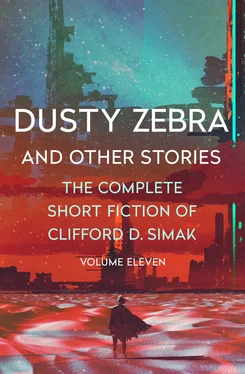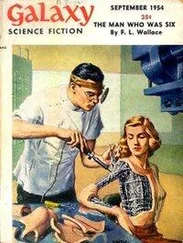“I’m sorry, Sara. I didn’t mean you. Nor any one person. Just the lot of us.”
The palms whispered harshly, fronds rasping. Little pools of water, left by the surging tide, sparkled in the sun.
“I won’t try to dissuade you,” Webster said. “You’ve thought it out, you know what it is you want.”
It hadn’t always been like that with the human race, he thought. There would have been a day, a thousand years ago, when a man would have argued about a thing like this. But Juwainism had ended all the petty quarrels. Juwainism had ended a lot of things.
“I’ve always thought,” Sara told him, softly, “if we could have stayed together—”
He made a gesture of impatience. “It’s just another thing we’ve lost, another thing that the human race let loose. Come to think it over, we lost a lot of things. Family ties and business, work and purpose.”
He turned to face her squarely. “If you want to come back, Sara—”
She shook her head. “It wouldn’t work, Jon. It’s been too many years.”
He nodded. There was no use denying it.
She rose and held out her hand. “If you ever decide to take the Sleep, find out my date. I’ll have them reserve a place right next to me.”
“I don’t think I ever shall,” he told her.
“All right, then. Good-bye, Jon.”
“Wait a second, Sara. You haven’t said a word about our son. I used to see him often, but—”
She laughed brightly. “Tom’s almost a grown man now, Jon. And it’s the strangest thing. He—”
“I haven’t seen him for so long,” Webster said again.
“No wonder. He’s scarcely in the city. It’s his hobby. Something he inherited from you, I guess. Pioneering in a way. I don’t know what else you’d call it.”
“You mean some new research. Something unusual.”
“Unusual, yes, but not research. Just goes out in the woods and lives by himself. He and a few of his friends. A bag of salt, a bow and arrows—yes, it’s queer,” Sara admitted, “but he has a lot of fun. Claims he’s learning something. And he does look healthy. Like a wolf. Strong and lean and a look about his eyes.”
She swung around and moved away.
“I’ll see you to the door,” said Webster.
She shook her head. “No. I’d rather that you wouldn’t.”
“You’re forgetting the jug.”
“You keep it, Jon. I won’t need it where I’m going.”
Webster put on the plastic “thinking cap,” snapped the button of the writer on his desk.
Chapter Twenty-six, he thought and the writer clicked and chuckled and wrote “Chapter XXVI.”
For a moment Webster held his mind clear, assembling his data, arranging his outline, then he began again. The writer clicked and gurgled, hummed into steady work:
The machines ran on, tended by the robots as they had been before, producing all the things they had produced before.
And the robots worked as they knew it was their right to work, their right and duty, doing the things they had been made to do.
The machines went on and the robots went on, producing wealth as if there were men to use it, just as if there were millions of men instead of a bare five thousand.
And the five thousand who had stayed behind or who had been left behind suddenly found themselves the masters of a world that had been geared to the millions, found themselves possessed of the wealth and services that only months before had been the wealth and services that had been due the millions.
There was no government, but there was no need of government, for all the crimes and abuses that government had held in check were as effectively held in check by the sudden wealth the five thousand had inherited. No man will steal when he can pick up what he wants without the bother of thievery. No man will contest with his neighbor over real estate when the entire world is real estate for the simple taking. Property rights almost overnight became a phrase that had no meaning in a world where there was more than enough for all.
Crimes of violence long before had been virtually eliminated from human society and with the economic pressure eased to a point where property rights ceased to be a point of friction, there was no need of government. No need, in fact, of many of the encumbrances of custom and convenience which man had carried forward from the beginnings of commerce. There was no need of currency, for exchange had no meaning in a world where to get a thing one need but ask for it or take it.
Relieved of economic pressure, the social pressures lessened, too. A man no longer found it necessary to conform to the standards and the acts of custom which had played so large a part in the post-Jovian world as an indication of commercial character.
Religion, which had been losing ground for centuries, entirely disappeared. The family unit, held together by tradition and by the economic necessity of a provider and protector, fell apart. Men and women lived together as they wished, parted when they wished. For there was no economic reason, no social reason why they shouldn’t.
Webster cleared his mind and the machine purred softly at him. He put up his hands, took off the cap, reread the last paragraph of the outline.
There, he thought, there is the root of it. If the families had stayed together. If Sara and I had stayed together.
He rubbed the warts on the back of his hand, wondering:
Wonder if Tom goes by my name or hers. Usually they take their mother’s name. I know I did at first until my mother asked me to change it. Said it would please my father and she didn’t mind. Said he was proud of the name he bore and I was his only child. And she had others.
If only we had stayed together. Then there’d be something worth living for. If we’d stayed together, Sara wouldn’t be taking the Sleep, wouldn’t be lying in a tank of fluid in suspended animation with the “dream cap” on her head.
Wonder what kind of dream she chose—what kind of synthetic life she picked out to live. I wanted to ask her, but I didn’t dare. It’s not the kind of thing, after all, that one can ask.
He reached out and picked up the cap again, put it on his head, marshaled his thoughts anew. The writer clicked into sudden life:
Man was bewildered. But not for long. Man tried. But not for long.
For the five thousand could not carry on the work of the millions who had gone to Jupiter to enter upon a better life in alien bodies. The five thousand did not have the skill, nor the dreams, nor the incentive.
And there were the psychological factors. The psychological factor of tradition which bore like a weight upon the minds of the men who had been left behind. The psychological factor of Juwainism which forced men to be honest with themselves and others, which forced men to perceive at last the hopelessness of the things they sought to do. Juwainism left no room for false courage. And false, foolhardy courage that didn’t know what it was going up against was the one thing the five thousand needed most.
What they did suffered by comparison with what had been done before and at last they came to know that the human dream of millions was too vast a thing for five thousand to attempt.
Life was good. Why worry? There was food and clothes and shelter, human companionship and luxury and entertainment—there was everything that one could ever wish.
Man gave up trying. Man enjoyed himself. Human achievement became a zero factor and human life a senseless paradise.
Webster took off the cap again, reached out and clicked off the writer.
If someone would only read it once I get it done, he thought. If someone would read and understand. If someone could realize where human life is going.
Читать дальше












